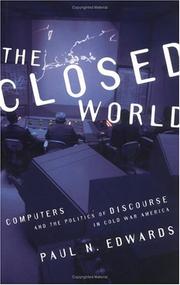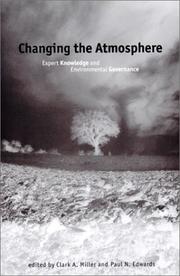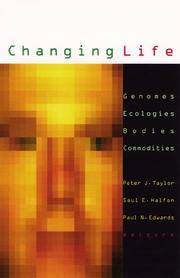| Listing 1 - 9 of 9 |
Sort by
|
Book
ISSN: 22572228 ISBN: 9782365090285 2365090281 Year: 2013 Volume: 21 Publisher: [Paris] : Éd. B2,
Abstract | Keywords | Export | Availability | Bookmark
 Loading...
Loading...Choose an application
- Reference Manager
- EndNote
- RefWorks (Direct export to RefWorks)
En conclusion du Nomos de la terre, Carl Schmitt conceptualisait, en 1950, les conséquences des guerres aériennes : en délocalisant les lignes de fronts offensif et défensif, les frappes aériennes transforment l'" ordre spatial international ". Dans Un monde clos, Paul Edwards en prolonge l'idée et nous dévoile non seulement la naissance d'un nouvel espace " fini ", mais aussi celle d'une Pax Americana " calculable " et, au moins en apparence, " sous contrôle ". Liée à de nombreux facteurs techniques, la montée en puissance de calculateurs digitaux au détriment de leurs ancêtres analogiques allait ainsi contribuer à faire de l'Ordinateur - certes plus discrètement que la Bombe - l'icône pop d'une nouvelle géographie du Monde libre...
Military art and science --- Communication --- Art et science militaires --- Technologies de l'information et de la communication --- Effect of technological innovations on --- Technological innovations --- Effet des innovations sur --- Conflit --- Propagande --- Informatique --- Ordinateurs --- Guerre froide --- Utilisation militaire --- Propagande.

ISBN: 0585002916 0262272164 0262550288 026205051X 9780262272162 9780262050517 9780262550284 9780585002910 Year: 1996 Publisher: Cambridge, Massachusetts : The MIT Press,
Abstract | Keywords | Export | Availability | Bookmark
 Loading...
Loading...Choose an application
- Reference Manager
- EndNote
- RefWorks (Direct export to RefWorks)
The Closed World offers a radically new alternative to the canonical histories of computers and cognitive science. Arguing that we can make sense of computers as tools only when we simultaneously grasp their roles as metaphors and political icons, Paul Edwards shows how Cold War social and cultural contexts shaped emerging computer technology--and were transformed, in turn, by information machines. The Closed World explores three apparently disparate histories--the history of American global power, the history of computing machines, and the history of subjectivity in science and culture--through the lens of the American political imagination. In the process, it reveals intimate links between the military projects of the Cold War, the evolution of digital computers, and the origins of cybernetics, cognitive psychology, and artificial intelligence. Edwards begins by describing the emergence of a "closed-world discourse" of global surveillance and control through high-technology military power. The Cold War political goal of "containment" led to the SAGE continental air defense system, Rand Corporation studies of nuclear strategy, and the advanced technologies of the Vietnam War. These and other centralized, computerized military command and control projects--for containing world-scale conflicts--helped closed-world discourse dominate Cold War political decisions. Their apotheosis was the Reagan-era plan for a "Star Wars" space-based ballistic missile defense. Edwards then shows how these military projects helped computers become axial metaphors in psychological theory. Analyzing the Macy Conferences on cybernetics, the Harvard Psycho-Acoustic Laboratory, and the early history of artificial intelligence, he describes the formation of a "cyborg discourse." By constructing both human minds and artificial intelligences as information machines, cyborg discourse assisted in integrating people into the hyper-complex technological systems of the closed world. Finally, Edwards explores the cyborg as political identity in science fiction--from the disembodied, panoptic AI of 2001: A Space Odyssey, to the mechanical robots of Star Wars and the engineered biological androids of Blade Runner--where Information Age culture and subjectivity were both reflected and constructed. Inside Technology series.
Computer Science --- Engineering & Applied Sciences --- Computers --- Military art and science --- History. --- Data processing --- SCIENCE, TECHNOLOGY & SOCIETY/General --- Fighting --- Military power --- Military science --- Warfare --- Warfare, Primitive --- Naval art and science --- War --- Data processing. --- Military applications

ISBN: 0262279819 1423725433 9780262279819 0262632195 0262133873 9780262632195 9780262133876 9781423725435 Year: 2001 Publisher: Cambridge, Mass. MIT Press
Abstract | Keywords | Export | Availability | Bookmark
 Loading...
Loading...Choose an application
- Reference Manager
- EndNote
- RefWorks (Direct export to RefWorks)
In recent years, Earth systems science has advanced rapidly, helping to transform climate change and other planetary risks into major political issues. Changing the Atmosphere strengthens our understanding of this important link between expert knowledge and environmental governance. In so doing, it illustrates how the emerging field of science and technology studies can inform our understanding of the human dimensions of global environmental change. Incorporating historical, sociological, and philosophical approaches, Changing the Atmosphere presents detailed empirical studies of climate science and its uptake into public policy. Topics include the scientific, political, and social processes involved in the creation of scientific knowledge about climate change; the historical and contemporary role of expert knowledge in creating and perpetuating policy concern about climate change; and the place of science in institutions of global environmental governance such as the World Meteorological Organization, the Framework Convention on Climate Change, and the Intergovernmental Panel on Climate Change. Together, the essays demonstrate fundamental connections between the science and politics of planet Earth. In the struggle to create sustainable forms of environmental governance, they indicate, a necessary first step is to understand how communities achieve credible, authoritative representations of nature.ContributorsPaul N. Edwards, Dale Jamieson, Sheila Jasanoff, Chunglin Kwa, Clark Miller, Stephen D. Norton, Stephen H. Schneider, Simon Shackley, Frederick Suppe
Environmental management --- Global environmental change --- Climatic changes --- Nature --- Globalization --- Earth & Environmental Sciences --- Environmental Sciences --- Effect of human beings on --- Global cities --- Globalisation --- Internationalization --- Changes, Climatic --- Climate change --- Climate changes --- Climate variations --- Climatic change --- Climatic fluctuations --- Climatic variations --- Global climate changes --- Global climatic changes --- Environmental change, Global --- Global change, Environmental --- Global environmental changes --- Environmental stewardship --- Stewardship, Environmental --- Environmental aspects --- International relations --- Anti-globalization movement --- Climatology --- Climate change mitigation --- Teleconnections (Climatology) --- Change --- Ecology --- Environmental sciences --- Management --- Changes in climate --- Climate change science --- Environmental management. --- Global environmental change. --- Climatic changes. --- Globalization. --- Effect of human beings on. --- ENVIRONMENT/Environmental Politics & Policy --- Anthropogenic effects on nature --- Ecological footprint --- Human beings --- Anthropogenic soils --- Human ecology --- Climatic changes - Environmental aspects --- Nature - Effect of human beings on
Book
ISBN: 1282899317 9786612899317 0262294109 9780262294102 9780262518635 9781282899315 9780262013925 0262013924 0262518635 661289931X Year: 2010 Publisher: Cambridge, Massachusetts [Piscataqay, New Jersey] MIT Press IEEE Xplore
Abstract | Keywords | Export | Availability | Bookmark
 Loading...
Loading...Choose an application
- Reference Manager
- EndNote
- RefWorks (Direct export to RefWorks)
Global warming skeptics often fall back on the argument that the scientific case for global warming is all model predictions, nothing but simulation; they warn us that we need to wait for real data, "sound science." In A Vast Machine Paul Edwards has news for these doubters: without models, there are no data. Today, no collection of signals or observations--even from satellites, which can "see" the whole planet with a single instrument--becomes global in time and space without passing through a series of data models. Everything we know about the world's climate we know through models. Edwards offers an engaging and innovative history of how scientists learned to understand the atmosphere--to measure it, trace its past, and model its future. Edwards argues that all our knowledge about climate change comes from three kinds of computer models: simulation models of weather and climate; reanalysis models, which recreate climate history from historical weather data; and data models, used to combine and adjust measurements from many different sources. Meteorology creates knowledge through an infrastructure (weather stations and other data platforms) that covers the whole world, making global data. This infrastructure generates information so vast in quantity and so diverse in quality and form that it can be understood only by computer analysis--making data global. Edwards describes the science behind the scientific consensus on climate change, arguing that over the years data and models have converged to create a stable, reliable, and trustworthy basis for the reality of global warming.
Weather forecasting. --- Climatology --- Meteorology --- Global temperature changes. --- History. --- Technological innovations. --- Temperature changes, Global --- World temperature changes --- Climate --- Climate science --- Science of climate --- Forecasting, Weather --- Short range weather forecasting --- Weather --- Weather prediction --- Forecasting --- Climatic changes --- Global environmental change --- Atmospheric temperature --- Geophysical prediction --- Climate sciences --- Atmospheric science --- Weather forecasting --- Global temperature changes --- History --- Temps (Météorologie) --- Climatologie --- Météorologie --- Température atmosphérique --- Prévision --- Histoire --- Modification à l'échelle planétaire --- Meteorology. Climatology --- Environmental protection. Environmental technology --- Artificial intelligence. Robotics. Simulation. Graphics --- Technological innovations --- Climatology - History --- Meteorology - History --- Climatology - Technological innovations
Book
ISBN: 9780262546386 Year: 2023 Publisher: Cambridge (Mass.) MIT Press
Abstract | Keywords | Export | Availability | Bookmark
 Loading...
Loading...Choose an application
- Reference Manager
- EndNote
- RefWorks (Direct export to RefWorks)

ISBN: 0816630127 Year: 1997 Publisher: Minneapolis Minnesota university press
Abstract | Keywords | Export | Availability | Bookmark
 Loading...
Loading...Choose an application
- Reference Manager
- EndNote
- RefWorks (Direct export to RefWorks)
Drawn from disciplines within science and technology studies and from geography, ecology, and developmental biology, the contributors offer a close look at how the mutable forms and concepts of life link the processes of science to those of information, finance, and commodities.
Life sciences --- Life sciences --- Political aspects --- Social aspects
Periodical
Year: 2018 Publisher: Cambridge, MA ; London Mit Press
Abstract | Keywords | Export | Availability | Bookmark
 Loading...
Loading...Choose an application
- Reference Manager
- EndNote
- RefWorks (Direct export to RefWorks)
Book
ISBN: 0262375958 0262375966 9780262375962 Year: 2023 Publisher: Cambridge MIT Press
Abstract | Keywords | Export | Availability | Bookmark
 Loading...
Loading...Choose an application
- Reference Manager
- EndNote
- RefWorks (Direct export to RefWorks)
A comprehensive history and examination of global infrastructures and the outsized role they play in our lives.Infrastructure is essential to defining how the public functions, yet there is little public knowledge regarding why and how it became today's strongest global force over government and individual lives. Who should build and maintain infrastructures? How are they to be protected? And why are they all in such bad shape? In Lifelines of Our Society, Dirk van Laak offers broad audiences a history of global infrastructures--focused on Western societies, over the past two hundred years--that considers all their many paradoxes. He illustrates three aspects of infrastructure: their development, their influence on nation building and colonialism, and finally, how individuals internalize infrastructure and increasingly become not only its user but regulator.Beginning with public works, infrastructure in the nineteenth century carried the hope that it would facilitate world peace. Van Laak shows how, instead, it transformed to promote consumerism's individual freedoms and our notions of work, leisure, and fulfillment. Lifelines of Our Society reveals how today's infrastructure is both a source and a reflection of concentrated power and economic growth, which takes the form of cities under permanent construction. Symbols of power, van Laak describes, come with vulnerability, and this book illustrates the dual nature of infrastructure's potential to hold nostalgia and inspire fear, to ease movement and govern ideas, and to bring independence to the nuclear family and control governments of the Global South.
Book

ISBN: 2735123863 Year: 2017 Publisher: Paris : Éditions de la Maison des sciences de l’homme,
Abstract | Keywords | Export | Availability | Bookmark
 Loading...
Loading...Choose an application
- Reference Manager
- EndNote
- RefWorks (Direct export to RefWorks)
On assiste actuellement à la multiplication des données numériques provenant de diverses sources : les administrations mettent en ligne leurs données de fonctionnement dans le cadre de démarches open data, les entreprises ouvrent certaines de leurs données non stratégiques, le monde scientifique utilise des données hétérogènes et de grande taille, et les internautes produisent des données à travers leurs activités quotidiennes sur le web. Loin d’être simplement mises en ligne, ces données sont « mises à disposition » des utilisateurs en vue de créer de nouveaux services et d’améliorer la connaissance des pratiques sociales. Comme le montre les discours d’accompagnement produits par les différents acteurs, les espoirs placés dans les données numériques sont nombreux et les transformations annoncées sont bien souvent présentées comme inéluctable et par défaut source de progrès. Loin de considérer cet « impératif d’ouverture » comme immuable, l’ambition du présent ouvrage est d’interroger de manière critique les multiples processus sociotechniques au sein desquels les données s’insèrent, de leur production à leur usage. Cette démarche propose d’ouvrir des pistes de réflexions pour mieux appréhender les évolutions de notre environnement numérique.
Information Science & Library Science --- Social Sciences, Interdisciplinary --- big data --- données numériques --- empowerment --- épistémologie des SHS --- gouvernement des données --- infrastructures informationnelles --- open data --- partage de données --- data sharing --- information infrastructure --- empowement --- epistemology --- political accountability --- science --- social science
| Listing 1 - 9 of 9 |
Sort by
|

 Search
Search Feedback
Feedback About UniCat
About UniCat  Help
Help News
News